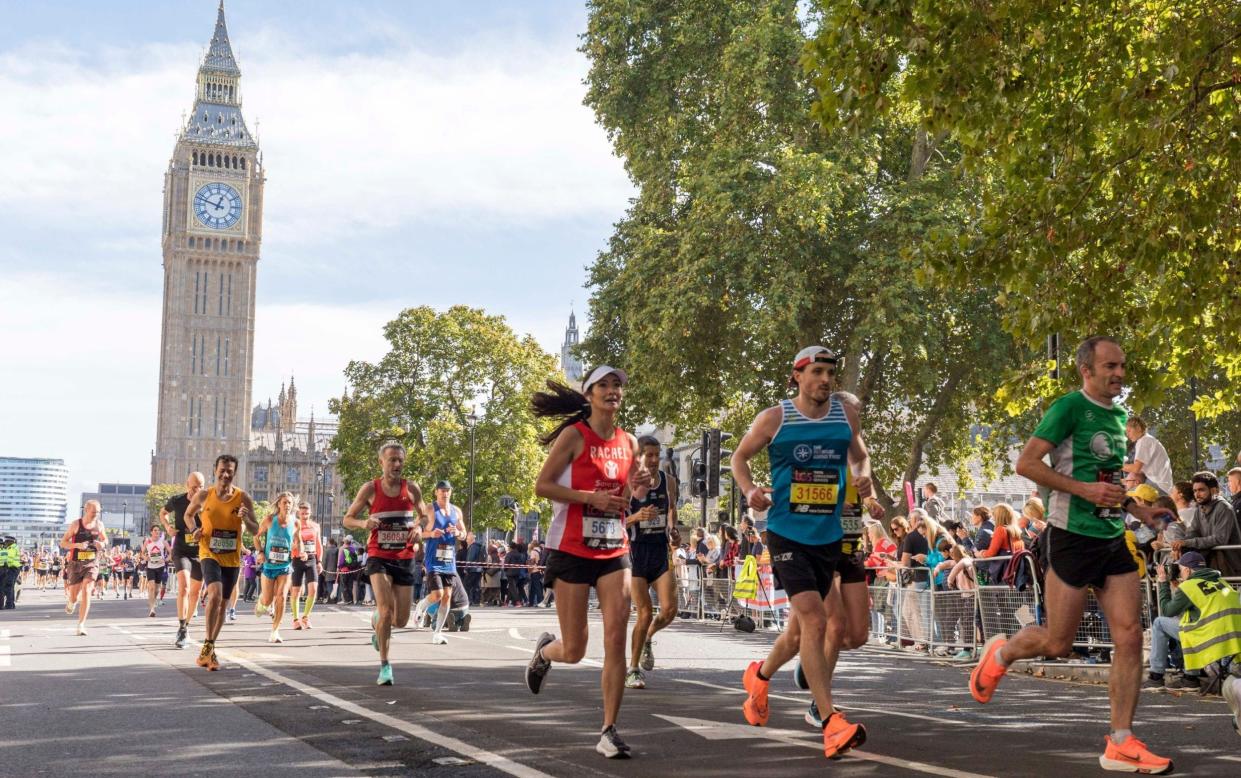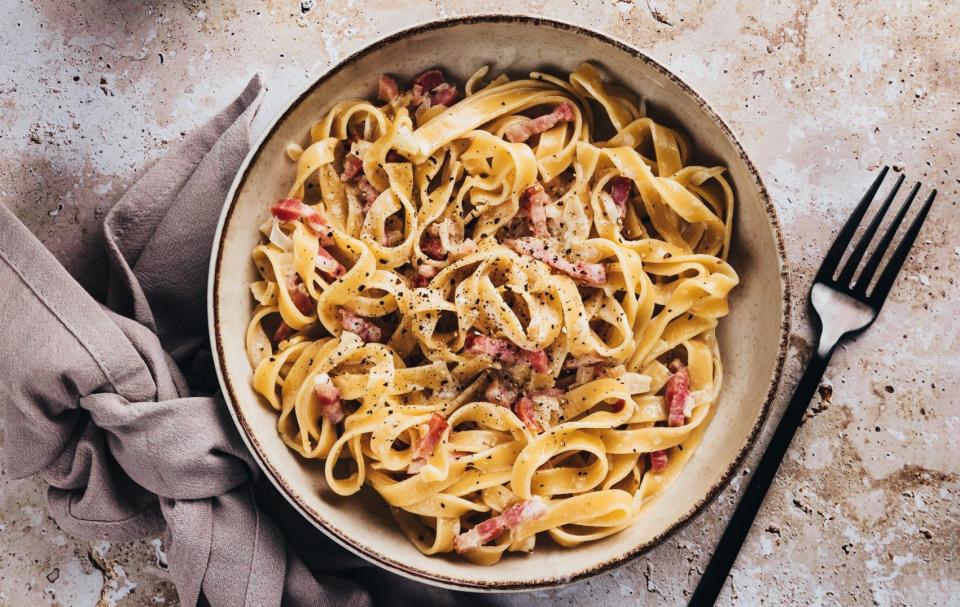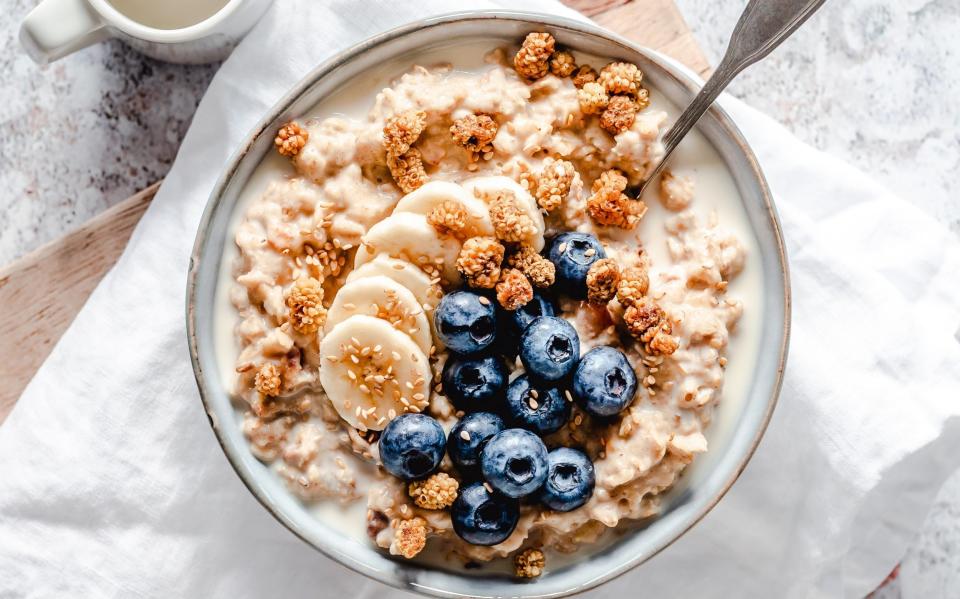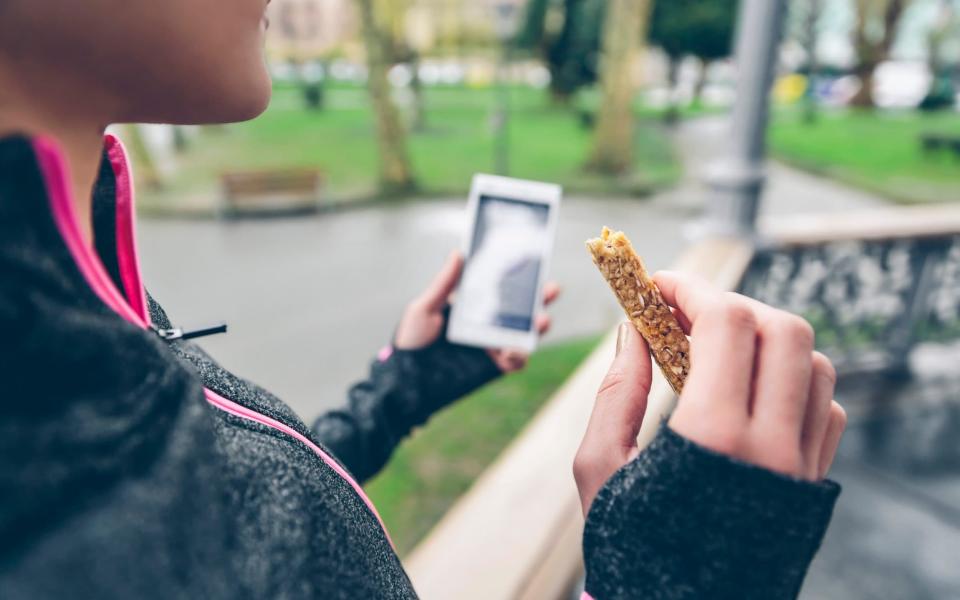What to eat before, during and after a marathon

- Oops!Something went wrong.Please try again later.
The night before a marathon in any major city, it’s impossible to get a table at an Italian restaurant – they will have been booked up for weeks by the thousands of hungry athletes who’ve descended and are on a mission to pack in the pasta ahead of race day.
Even if you’re not a regular runner, you’re probably familiar with the concept of carb-loading – but it turns out there’s a bit more to it than simply stuffing your face with carbonara ahead of running 26.2 miles. Endurance running puts your body under huge pressure – not least your digestive system, which can make or break your performance on the day.
If you don’t want to hit the wall at 20 miles due to under-fuelling, miss out on a personal best because you were queuing for the loos halfway round, or, God forbid, “do a Paula” (at the 2005 London Marathon, Paula Radcliffe famously took a very public toilet break, thanks to an upset stomach), you’ll need to carefully prepare in the hours and days before the race.
Before
This is where the carb-loading comes in – but for a full marathon it needs to start gradually in the days leading up to race day, and not just the night before.
Glycogen is your friend
Carbohydrates are magic marathon fuel because they boost glycogen levels – the body’s main energy source for running. And if we don’t have enough glycogen in our system before we set out, we’re asking for trouble. Anita Bean is a bestselling food author and sports nutritionist for TCS London Marathon. “Glycogen is essentially your main fuel,” she explains. “But the problem is we only have limited capacity to store it. We can store 500g in our bodies, which is only enough to fuel us for approximately 18-22 miles at marathon pace.
“When those carb stores get depleted that’s when that deep fatigue sets in and you’re no longer able to maintain your pace. ‘Hitting the wall’, as it’s known, happens if you have severely depleted your glycogen stores – you might feel weak, dizzy, and emotional, with your legs turning to jelly. It’s a terrible feeling.”
Carb-load but don’t overload
Increasing carb intake in the three days or so before the race, while tapering off your training, is the way to fill those glycogen stores to maximum capacity. But it doesn’t mean simply eating as much beige food as possible. “It’s about having larger portions of things like potatoes, pasta, rice, noodles, oats or grains,” says Bean. “But if you have mountains of pasta, or anything, you can risk overloading which could backfire and disrupt your sleep and make you feel bloated and lethargic on the day.”

Favour plain foods
On the night before the race, Bean recommends playing it safe and sticking to plain, familiar foods; this can be tricky if you’re out of town for your marathon and reliant on eating out, but it’s worth asking the chef if they can tweak your dish to be less rich or oily than usual – simple rice and pasta dishes are a great option. “Don’t experiment with anything you haven’t had before in case it triggers anything unpleasant,” advises Bean.
Have breakfast
On race day itself, breakfast is important – it’s a chance to top up the stores of liver glycogen which, unlike muscle glycogen, become depleted overnight. Many major marathons have mid-morning starts, giving you plenty of time for a decent breakfast when you wake up, but it can be tricky if you’re setting out early, or need to travel.
“Essentially it’s a trade-off between getting enough sleep and getting your breakfast in without needing to get up at 3am!” says Bean. “Ideally, you want to eat two to four hours beforehand to give your body the chance to digest the carbohydrate. You want easy-to-digest foods that are high in carbs and low in fat – overnight oats, muesli or granola are good options, or toast with various toppings. If you are prone to gut problems, keep an eye on fibre too; for instance, go for a white bagel over a high-fibre cereal. Above all, stick to what you know works for you – whatever you did on your long training runs is what you want on race-day morning.”

Pack a pre-race snack
Depending on timings, Bean also suggests bringing along a small snack to eat in the hour before the race – perhaps a banana, cereal bar or energy gel to give you a cheeky extra carb kick before you set off. Some runners even enjoy a coffee beforehand, since caffeine can boost performance – just make sure you factor in a final loo stop before the race.
Hydrate
Drinking plenty of water in the days and hours before your marathon, as well as during it, is crucial too, since dehydration can also severely impact your performance – and indeed your health.
During
You’re off – and, hopefully, you have come up with a fuelling plan to keep you going as you pound the pavements or tramp the trails. If you’ve only ever run short distances before, getting to grips with eating on the move can be a challenge – but marathon training is as much about nailing the fuelling as it is about getting your legs in shape to run 26 miles.
Energy gels are go
These days, most athletes use energy gels or bars specifically designed for running, as they’re portable and have been manufactured to meet every nutritional need, but some runners do still prefer “real” foods, like bananas or flapjacks – or just good old Jelly Babies.

Whatever your fuel of choice – and the number one rule is to not try anything on race day that you haven’t used in training – you’ll want to make sure you’ve stashed enough of them in your pockets or belt to consume some every half an hour or so during the race. “You need to start fuelling pretty early,” says Bean. “Even if you feel fantastic and energetic for the first 10K or so, if you haven’t got the fuel in early you might crash harder later on.”
Calculate how much fuel you need
If you’re a super-speedy runner aiming for a marathon time of less than three hours, you’ll need up to 90 grams of carbs per hour – as long as your body was able to cope with this in training. For the more recreational runners among us, it’s a fair bit less – around 60g of carbs per hour if you’re aiming to complete the course in under four hours, or 30g per hour if you’re going for a sub-five.
It’s worth shopping around for an energy product you don’t hate the taste or texture of, since they can vary considerably – and if you’re offered anything on the course (for instance, TCS London Marathon provides Lucozade-branded gels at various intervals – and there are always spectators wielding Percy Pigs!), only take them if it’s a brand you know your stomach can handle. Some contain added caffeine for an extra boost – but this can lead to an unwanted dash to the loo. While runners often down their gels like shots of sambuca, it’s gentler on your digestive system to sip them gradually over a few minutes.
Many long-distance runners, especially those who are “salty sweaters” also take electrolyte products while running, either in the form of a capsule or chew, or as a soluble tablet in water. If your skin feels gritty when you sweat or you find white marks on your clothes after running, this is you, and it’s particularly wise in hot weather, as losing lots of salt can lead to crippling leg cramps.
Whatever your strategy, it’s fair to say that by the end of the race, you’ll never want to taste another sugary gel again – but if you have fuelled properly, they will have helped you earn that medal.
After
You’ve just run 26.2 miles so you might think you can eat whatever your heart desires, but annoyingly, you may well find that your body doesn’t co-operate. Many runners feel a bit sick or suffer stomach cramps after a marathon – but you should still try to eat something substantial as soon as you can.
Pack smart
Since it can take a while to make your way off the course, it’s wise to pack something tasty in your kitbag, or leave a snack with any loved ones who have been spectating. A packet of salty crisps and a fizzy drink can be just the thing to tide you over until you can get to a proper meal: in running circles, Coca Cola is even known as “the red ambulance” for its amazing restorative post-marathon powers!
Eat protein for recovery
While it was all about carbs before and during the race, protein comes back into play after you’ve crossed the finish line – it can help your body recover more quickly and reduce muscle damage. A ready-made protein shake offers a good quick fix ahead of the big, juicy burger you might well be dreaming of.
Be mindful about a post-run pint
Many runners also enjoy toasting their victory with a swift pint of beer – but you should definitely exercise some caution here, since it’s likely to go straight to your head and your stomach.
Running a marathon can burn more than 2,500 calories, so you might find you’re ravenous for days afterwards. Go for it and book in some celebratory feasts with your friends and family – you definitely deserve them.
Recommended
How to train for a marathon no matter how fit you are

